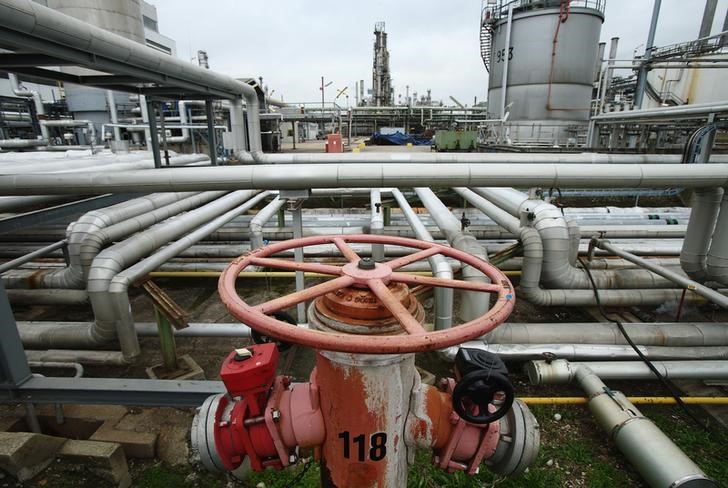* OPEC oil production: https://tmsnrt.rs/2LArZY3
* U.S. oil production: https://tmsnrt.rs/2VVVEiv
* OPEC spare capacity (EIA): https://tmsnrt.rs/2VVkYFd
LONDON, Sept 14 (Reuters) - An attack on Saudi oil
facilities on Saturday is believed to have disrupted half the
country's production capacity, making the United States the only
real holder of the global supply cushion via its ability to
raise own output or to soften sanctions against other major oil
producers.
Saudi Arabia has yet to comment on the extent of damage on
its oil production but industry sources have said some 5-6
million barrels per day (bpd) or 5-6% of global supply have been
affected. Saudi Arabia, the Organization of the Petroleum Exporting
Countries' de-facto leader and largest producer, has been long
seen as the custodian of the world's spare oil capacity.
Spare capacity is the extra oil a producing country can
bring onstream and sustain at short notice, providing global
markets with a cushion in the event of natural disaster,
conflict or any other cause of an unplanned supply outage.
Industry sources have said Saudi Arabia will be able to
restore supply within days. A prolonged supply outage will have
a major bullish impact on oil prices, which in turn will spur
further gains in U.S. shale production.
The United States has briefly overtaken Saudi Arabia as the
world largest crude exporter this year, only a few years after
removing a ban on oil exports because of large needs at home as
the world's largest oil consumer.
Analysts have repeatedly underestimated U.S. output growth
gains with the country now producing around 15% of global
supply.
Besides the United States, the only countries which have
significant spare capacity are Iran and Venezuela.
Both are subject to U.S. sanctions and have seen their
exports reduced to a trickle over the past year as U.S.
President Donald Trump has tightened sanctions.
Iran has seen its exports falling by over 2 million bpd
since the sanctions have been imposed and Venezuela have seen
its exports plummeting too.
While analysts expect Venezuelan production to more or less
stabilise at current levels of around 700,000-800,000 bpd for
the rest of the year, Iranian oil production is forecast to fall
further.
Energy Aspects has said it expects OPEC spare capacity to
fall to below 1 million bpd in the fourth quarter from two
million bpd in the second quarter of 2019.
WILDCARDS
OPEC member Libya is in the middle of a civil war, which
threatens its ability to continue pumping oil. Another big
Libyan disruption would add to the shocks and highlight the
spare capacity problem.
Nigerian exports have also suffered big from disruptions.
Meanwhile, U.S. crude oil production is expected to rise to
new records.
However, large U.S. crude output gains and slowing global
demand because of a weaker global economy have contributed to a
rise in oil stocks worldwide.
The International Energy Agency, which coordinates energy
policies of industrialised nations, said on Saturday the markets
were still well supplies despite the Saudi disruptions.
"We are massively oversupplied," said Christyan Malek, head
of oil and gas research for Europe, Middle East and Africa at
J.P. Morgan, adding it would take five months of a 5 million-bpd
outage to take global crude supply levels back to a 40-year
normal average.
"Having said that, this attack introduces a new,
irreversible risk premium into the market," he added.
OPEC Oil Production https://tmsnrt.rs/2LArZY3
OPEC Oil Production png https://tmsnrt.rs/2VXGPMh
U.S. Oil Production https://tmsnrt.rs/2VVVEiv
U.S. Oil Production png https://tmsnrt.rs/2Wzk9yX
Spare Capacity -GS https://tmsnrt.rs/2Wz3H1H
OPEC oil production capacity interactive https://tmsnrt.rs/2VVkYFd
OPEC oil production capacity png https://tmsnrt.rs/2VVl0wP
^^^^^^^^^^^^^^^^^^^^^^^^^^^^^^^^^^^^^^^^^^^^^^^^^^^^^^^^^^^>
(Reportin by Dmitry Zhdannikov and Ron Bousso; Writing by
Dmitry Zhdannikov;
Editing by Marguerita Choy)
